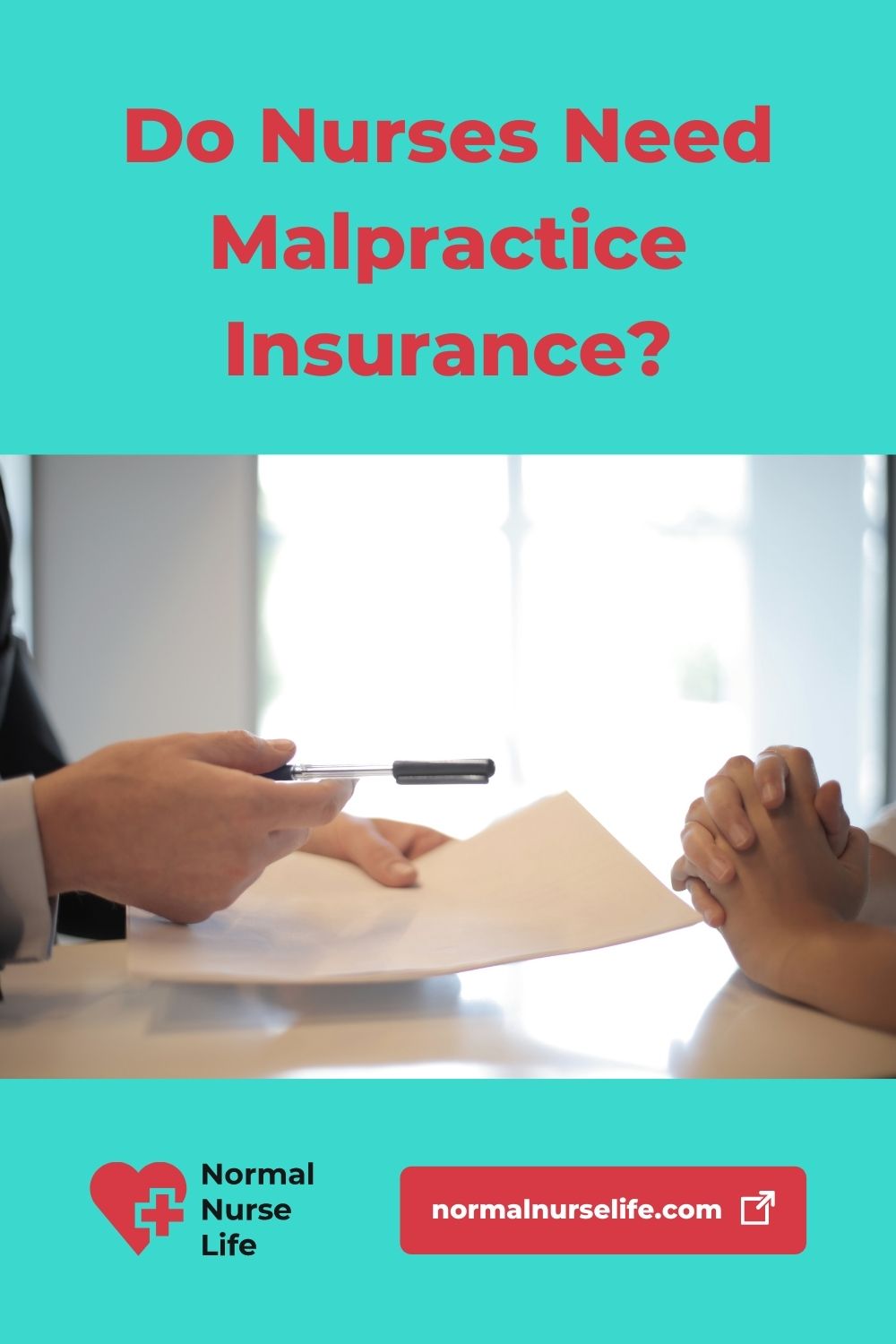For a nurse, though a medical insurance carrier covers malpractice insurance in the majority of cases, some of the nurses are not covered.
To protect themselves from getting sued for any medical-related malpractice and getting involved in severe reputational damage, a nurse should be ensured of malpractice insurance.
Do nurses need malpractice insurance?
Yes, registered nurses need malpractice insurance.
If your employer covers appropriate PII employee coverage, then clarify the coverage aspects too. If not, get one for yourself.
On your own, having malpractice insurance can cover all the aspects, unlike some employer insurance coverage, which is primarily for the employer’s interest.
Your own policy can give you peace of mind when something unlikely impacts your profession.
Malpractice insurance has all situations covered for nurses like legal claim settlement, paying any judgment, paying for legal defense, and covering whatever is in the policy limits.
A policy with defense coverage will shield you when a nurse is presented before a governing body or a board.
Medical malpractice can be any wrongful act or negligence, or omission of a surgeon or a physician or another nurse because treatment falls short or fails to meet the required standard.
Related articles of ours:
Any severe to a minor injury can occur as a result, which can even cause death in some cases.
Pin me on Pinterest!

Table of Contents
Malpractice primary categories
A nurse, doctor, medical professional, or care providers who has responsibility for duty in healthcare can fall into malpractice when:
- He or she fails to provide standard care as per medical terms.
- Any injury or damage of the patient because of improper health care.
- Breach of duty or negligence.
The plaintiff should prove that the responsible person failed to give the medical care that is acceptable and standard to healthcare, and there was a duty breach to win the case of malpractice.
Any kind of related loss should be able to be proved as a breach or negligence.
Since nurses are primary caregivers, they can get into these glitches more easily and get complicated.
This becomes all the more necessary for them to carry malpractice insurance.
Do school nurses need malpractice insurance?
Generally, a school district covered their nurse malpractice insurance, as per legal principles.
However, it should be clear about the terms and conditions and what type of coverage you get.
This is where school nurses need malpractice insurance if appropriate coverage is not given on broad terms.
Understand what the district gives legal defense coverage covered insurance under a board action.
It is essential as it is something like driving your vehicle without vehicle insurance.
See also: Can You Be a Nurse With a DUI?
This implies that when you require legal representation, it can become pricey.
So, purchase malpractice insurance coverage with this coverage when the school doesn’t have this coverage.
As a school nurse, there is a high chance of being exposed to situations where students are injured and need medical care.
So, in such cases, malpractice coverage comes in very handy as there is an equal risk in dealing with active young students.
School nurse malpractice insurance protects medical services offered by educational facilities and comes with general liability policy and not as a separate policy.
Know what is excluded and included in the policy to be sure.
Generally, this insurance has coverage of surgical, X-ray, medical, dental, or nursing treatment or providing beverages or food and furnishing medical drugs, surgical supplies or dental supplies or appliances.
Insurance doesn’t cover incurred expenses for first aid, supplementary payments, and any injury by an indemnity.
Do nurse anesthetists need malpractice insurance?
Yes, nurse anesthetists need malpractice insurance. They have to pay for CRNA full-time malpractice insurance about 3,900 dollars annually on an average.
When getting this insurance, ensure your employer has covered it for you or get your own umbrella policy.
This is to protect you from the unlikely loss of coverage.
For part-time CRNA coverage, it will cost you 2,230 dollars yearly on an average.
The primary points covered by the malpractice insurance for nurse anesthetists:
- The plan permits you to practice anesthesia in most of the states.
- Even when you are a fresher as an anesthetist, your coverage is not with any CRNA related limitations with the insurance policy.
- You can fill in for other CRNA while you remain protected with no additional expense.
- You can work for any number of hours, even when you are a CRNA full-time with a malpractice insurance plan.
See also: PACU Nurse Interview Questions
Why do nurses need malpractice insurance?
Nurses in clinical and hospital settings have to take care of several tasks that are primary to healthcare.
Whenever a contradictory outcome arises, doctors and nurses equally find them in a situation facing legal issues.
Doctors overcome their situation with malpractice insurance, how several nurses fall into trouble due to lack of malpractice insurance.
Even nurses should carry this insurance to be out of trouble in case of an unlikely event.
See also: Do Travel Nurses Get Health Insurance?
If you are a registered nurse, get malpractice insurance with optimum coverage and the policy in the right place to handle any kind of related legal issues.
See also: How to Become a Registered Nurse
Yes, nurses do need malpractice insurance as this insurance will shield them from any alleged negligence in defense.
Some employers do not fully cover nurses, and in cases where employers get bankrupt, coverage for nurses is not done fully.
Why an employer’s policy is not sufficient?
Employers’ policy is meant to protect employers’ interest foremost and the coverage given by them is not full coverage for a nurse.
Having your own policy ensures your attorney is allotted and he or she works in your best interests.
He or she will meet your specific needs.
Employer’s policy is usually shared with other defendants.
So, your legal expenses will also be under shared limits of liability under the policy, in case of a legal claim.
This can eventually result in extra expenses that you will have to bear out of your pocket.
It can get pretty expensive too.
Another reason is that the policy remains ineffective post the termination of your job.
See also: How Can Nurses Influence Policy?
It is also ineffective in contractual, agency employment, and part-time nurse jobs. Full-time nurse coverage is different from part-time and other contractual nurses.
See also: Can Nurses Work Part-Time?
Your personal legal expenses also will not be covered in the employer’s policy.
In some extreme cases, the employer can file a suit considering the malpractice is done by you.
Ensure your employer’s policy coverage to be safe when taking up a job in a healthcare facility.
This is why it becomes all the more important to get malpractice insurance on your own.
Keeping the number of complaints that are filed every year against the healthcare providers, as per BON-Board of Nurses, it is recommended to get this insurance to avoid your license getting at stake.
Your malpractice insurance will cover legal fees and fees incurred in a fight opposite BON.
The good news is that some of these insurances also have coverage of time compensation from work and pay you for meals and lodging.
Reasons why do nurses need malpractice insurance:
- Firstly, to keep them covered from legal issues in case of alleged negligence.
- Peace of mind with your own insurance coverage.
- Shield them when your employer doesn’t cover you.
- Shield you when you do work voluntarily or outside work hours, which are not covered in the professional policy.
- It covers you when you change jobs and when your employer policy is not covered for you.
- It covers you precisely for the type of coverage you require.
- Covers you as a defense for any settlements pay for judgments while continuing your work without any breaks.
- It is a direct one-on-one association between you and your insurance company without any employer in between. So you can handle the claim on your own.
- It covers you as insured rather than your employer. When employer insurance covers you, you may not be named as insured as it is generally listed as all employees. You are not fully aware of the claims as your employer deals with the insurance.
- You are assigned an attorney representing you in case of any legal proceedings. His or her expenses are not paid by you, which otherwise can become very expensive for you. However, the attorney costs should be within the policy limits. If not, at least part of the fee is covered or reimbursed by the insurance as per limits.
- When a claim is made, there are situations where you and your employer may not be going along. When the injury occurred, if you were outside the job arena with timings or duties, you can get caught, and the employer policy will not cover the claim. This is where your malpractice insurance is liable.
Conclusion
When you are a nurse, having your own malpractice insurance gives you added peace and protection.
This is particularly true for nurses who are associated with working in specialty and critical areas.
See also: How to Become a Neonatal Nurse
In case of an injury or medical issue, a nurse can be held responsible for the suffering.
A nurse may be held for settlement.
When your employer’s insurance policy is not sufficiently covering to pay the odds, you become responsible for overall/partial settlement and pay.
Getting your malpractice insurance will save you from such unlikely legal cobwebs.
This will save your savings, and you continue to work without your reputation being compromised.
Related articles of ours for you to check out:
- Do Nurses Get Health Insurance?
- Do Nurses Get Drug Tested?
- Do Nurses Get Pensions?
- Do Nurses Take an Oath or Not?
- Do NPs Need Malpractice Insurance?
- How Much Is Nurse Practitioner Malpractice Insurance?
I’d be glad if you could give this article a star rating. Thank you in advance!
